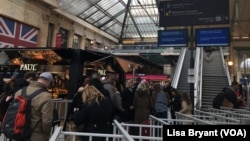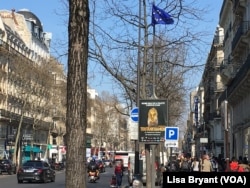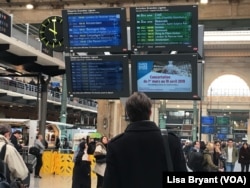Max Broby waited patiently in the heart of a snaking line of Britain-bound Eurostar passengers that barely seemed to budge. The 40-year-old Dane had arrived early at the Gare du Nord train station, in northern Paris. It didn’t help.
The immediate cause: an ongoing strike by French customs agents slowing border checks in what they warn might happen when Britain leaves the European Union. But Broby, an architect with businesses in Paris and London, is focused on bigger losses.
“As a Dane, I think it’s such a sad catastrophe seeing a country sort of self-destruct like this,” he said of the Brexit turmoil roiling nearby Britain. “It seems so unnecessary, so very sad on every level.”
Slow motion process
For nearly three years, Europeans have been watching the chaotic Brexit process unfold with a mix of indifference, exasperation and, to a lesser extent, alarm.
While every twist and turn in the tortured negotiations has grabbed British headlines, most other European media have covered the process only sporadically, concentrating on concerns closer to home. Indeed, a Euronews poll released in January found nearly one-third of French and Italians thought Brexit had already happened.
Only now, as the official May 29 Brexit deadline approaches, are many Europeans beginning to focus — sort of — on what that might mean. And any sense of impending change is diluted by chances EU leaders meeting in Brussels Thursday and Friday may grant Britain a delay.
“People just have other priorities,” said analyst Larissa Brunner, of the European Policy Centre in Brussels. “It’s seen as a kind of isolated issue of the British shooting themselves in the foot, with limited consequences for the rest of Europe. Whereas something like the migration crisis affects people’s everyday life.”
Brexit fallout
Still, the Brexit process has nonetheless permeated European mindsets in sometimes subtle ways. Analysts cite a modest rise in public support for the EU. And some populist parties are toning down their anti-EU rhetoric.
France’s National Rally leader Marine Le Pen, for example, no longer talks about a French-style Frexit, or even leaving the euro currency zone. Italy’s populist government is similarly silent. And while governments in Hungary and Poland continue to sharply criticize the EU, the populations of both countries are strongly pro-European.
“I think a lot of Europeans now see how difficult it is to achieve Brexit from the British perspective, and are a lot more cautious” about wanting to follow suit,” said Manuel Lafont Rapnouil, head of the European Council on Foreign Relations’ Paris office.
Peace, democracy — bureaucracy
Still there are few Europeans loudly cheering the EU on. Many dismiss the bloc and its executive body as an overly bureaucratic and annoying roadblock in their daily lives.
While the majority give the EU high marks for promoting peace, democracy and prosperity, they also consider it inefficient and intrusive, and lacking understanding about the needs of its citizens, according to a Pew Research Center survey, released this week.
At the Gare du Nord, linking France to Britain and other northern destinations, French Eurostar passenger Dianna Hamadache said she understood pro-Brexit sentiments.
“We French like to keep our identity, just like Britain,” she said. While considering herself moderately pro-European, Hamadache nonetheless blames the European Union for deepening French debts and indirectly contributing to the yellow vest protest movement over high living costs.
“Brexit is a bad idea,” countered Jerome Huijsing from the Netherlands, before heading for an Amsterdam-bound train — with no line, thanks to Europe’s passport-fee Schengen zone. “We Europeans have lots of advantages. We have to pay for them, but we have them and that’s good.”
Still, such sentiments are unlikely to translate into a strong boost for pro-EU parties in May European Parliament elections, analysts say.
“Turnout is traditionally low,” said Brunner, of the European Policy Centre, “and national issues tend to dominate.”
Will EU unity last?
For a block that has squabbled over core issues like immigration and whether to forge stronger economic and defense bonds, the 27 other EU governments been surprisingly united when it comes to Brexit negotiations with the UK.
But that unity risks unraveling if it comes to a potential no-deal scenario, Brunner said.
“It would be tempting for individual member states to circumvent the European Commission and strike separate deals with Britain,” she said of the EU executive body. “Similarly I would expect much more division during trade negotiations with Britain” in which each member state would present its demands, making the final list impossibly long.
Yet paradoxically, according to some observers, the Brexit process may have been good for the European Union.
“You have a lot of people who say there’s a new dynamic — on defense, foreign policy and other issues,” said analyst Lafont Rapnouil. These may lose traction, he adds, if a divided Britain somehow remains part of the bloc — possibly via a second referendum or an indefinitely extended departure.
France and Germany also want to forge new bonds with a post-Brexit Britain in areas like defense, he added. But with political energy now consumed by a seemingly unending Brexit process, it “prevents Europe and the UK from building something together,” Lafont Rapnouil said.
Baffled by how Britain got here
At Gare du Nord, architect Broby is baffled at how Britain got into its current mess. Describing himself as an EU fan, he draws parallels with his native Denmark. Both countries negotiated with Brussels to keep key assets, including their national currency and certain veto rights that he believes answer domestic aspirations for greater autonomy.
“Obviously, the EU needs a lot of really critical reforms,” Broby said. “But surely you want to be around the table at times like this, and not burning your bridges.”







